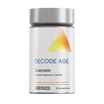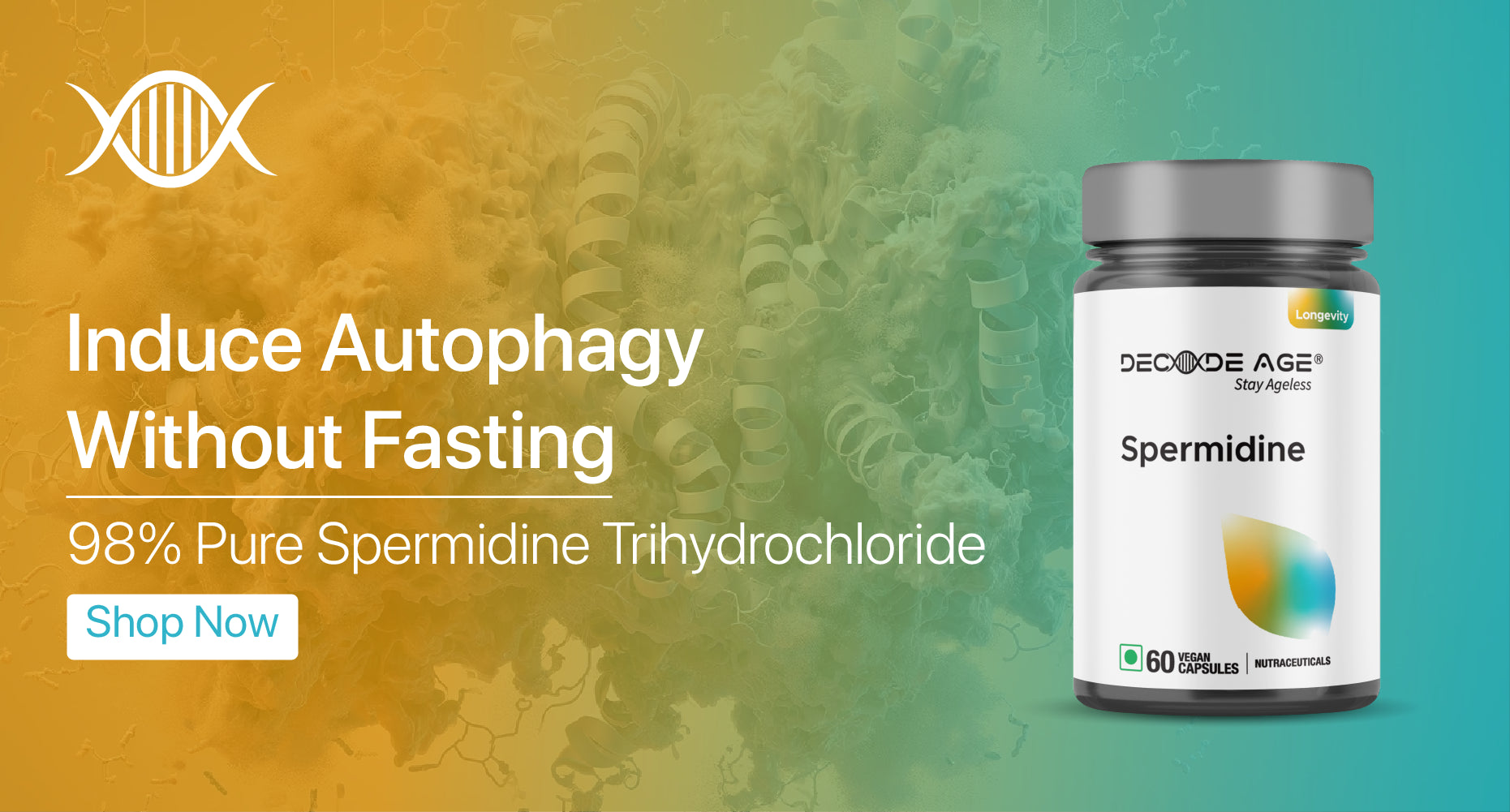Spermidine is a natural substance found in our bodies and in many foods, like wheat germ, soybeans, nuts, fruits, vegetables, and certain cheeses. It's a polyamine compound made up of several amino groups that play a vital role in our health. Originally discovered in semen, it's also present in tissues and supports metabolic processes. Spermidine binds to DNA, aids cell growth, and maintains healthy cell function.
There are three main ways in which Spermidine works to improve our health by improving health by promoting autophagy, protecting DNA and cells, and enhancing mitochondrial function.
Types of Spermidines
Two primary types of Spermidine supplements are available: wheat germ extract and Spermidine trihydrochloride. Both of these forms have garnered interest for their possible advantages in prolonging lifespans and promoting overall health.
Wheat Germ Extract
Wheat germ extract naturally contains a lot of Spermidine. Wheat germ is the most nutritious part of wheat grains and is processed to extract Spermidine, which makes it easy to take as a supplement. People have been using this form of Spermidine in traditional medicine for a long time, and now it's becoming more popular because of its possible health advantages.
Spermidine Trihydrochloride
Spermidine Trihydrochloride is a synthetic, water-soluble form of spermidine. It's gaining attention for its potential health perks, like boosting autophagy, safeguarding the brain, supporting heart health, and acting as an antioxidant. Studies suggest it can extend the lifespan and health span of various organisms, including yeast, worms, flies, mice, and possibly humans. Moreover, research indicates that Spermidine trihydrochloride might also inhibit the growth of cancer cells. However, more investigation is necessary to fully grasp its effects on cancer.
Decode Age Spermidine capsules are made with 99% Spermidine Trihydrochloride, ensuring top quality and effectiveness. This sets our product apart, as it contains much higher levels of Spermidine compared to others like Wheat Germ Extracts, which only have small traces. By opting for Decode Age, users get a carefully crafted product with a concentrated form of Spermidine, maximising its potential advantages.
What Happens When You Take Decode Age Spermidine Supplement?
Here's a breakdown of what occurs at the cellular level.
Day 1
Spermidine to Spermine: Spermidine is converted to spermine in your gut, and then it is absorbed into the bloodstream to enter the cells and activate autophagy genes across the body.
DAY 10
Cellular Energy: Efficient removal & recycling of damaged cell components through autophagy improves cellular energy.
4 WEEKS
Improves Cognition: Efficient removal of damaged proteins from neurons reduces brain fog and improves mental clarity.
6 WEEKS
Enhanced Skin: Boosts collagen production, resulting in improved skin texture, tone and elasticity.
3 MONTHS
Healthier Hair: A 90-day study showed that Spermidine supplementation promoted hair growth and stress resistance in human subjects.
+ 6 MONTHS
Healthy Ageing: The autophagy process is well-established, leading to more noticeable healthy ageing effects on the skin and maintaining hair health.
Recommended Dosage and Timing:
Optimal Dosage: Adults can take 10 to 15 mg of Spermidine daily. (R)
|
Age (Years) |
Consumption |
Timings |
|
18-50 |
10mg or 1 capsule daily |
In the morning |
|
50+ |
20 mg or 2 capsules daily |
1 in the morning and 1 at night |
Is It Safe to Consume Decode Age Spermidine?
Spermidine, which is generally safe, is a natural compound vital for autophagy. However, as with any supplement, there are certain considerations:
- Health Conditions: If you have underlying health conditions or are on medication, it's essential to consult with a healthcare provider before starting spermidine.
- Pregnancy and Breastfeeding: There is limited research on spermidine's effects during pregnancy and breastfeeding. It's advisable to avoid Spermidine supplementation during these periods.
- Age Factor: Spermidine is primarily researched for its benefits in ageing. Young individuals, especially those under 18, should consult a healthcare provider before using.
Key Notes:
Start Small: Begin with 1 capsule each day in the morning.
Listen to Your Body: See how you feel. If everything seems good, you can gradually increase your dose to 2 capsules, over a few months.
Consistency is Key: Stick with it every day. You might not notice changes overnight, but give it time.
Stay Balanced: Combine your Spermidine intake with healthy eating and staying active for the best results.
Consult your physician before taking this supplement if you have bleeding disorders, are on blood-thinning medications, or are pregnant or breastfeeding.
Conclusion
In conclusion, spermidine emerges as a promising compound for enhancing health and potentially extending lifespan. Its ability to support cellular function, protect DNA, and boost energy production holds significant implications for combating age-related diseases and promoting overall well-being. By incorporating spermidine-rich foods into one's diet and carefully monitoring dosage, individuals can take proactive steps towards better health and longevity. Consulting healthcare professionals for personalised advice, particularly for those with existing health conditions, remains essential. Embracing spermidine as a daily supplement could be a valuable strategy for maintaining vitality as we age.
Reference
Longevity in response to lowered insulin signaling requires glycine N-methyltransferase-dependent spermidine production
(Tain, L. S., Jain, C., Nespital, T., Froehlich, J., Hinze, Y., Grönke, S., & Partridge, L. (2019). Longevity in response to lowered insulin signaling requires glycine N-methyltransferase-dependent spermidine production. Aging Cell, 19(1), e13043.)
High-Dose Spermidine Supplementation Does Not Increase Spermidine Levels in Blood Plasma and Saliva of Healthy Adults: A Randomized Placebo-Controlled Pharmacokinetic and Metabolomic Study.
(Senekowitsch, S., Wietkamp, E., Grimm, M., Schmelter, F., Schick, P., Kordowski, A., Sina, C., Otzen, H., Weitschies, W., & Smollich, M. (2023). High-Dose Spermidine Supplementation Does Not Increase Spermidine Levels in Blood Plasma and Saliva of Healthy Adults: A Randomized Placebo-Controlled Pharmacokinetic and Metabolomic Study. Nutrients, 15(8).)
FAQs
1) How is Spermidine formed?
Spermidine is made from putrescine. It's found in almost all tissues and is usually linked with nucleic acids. It's a positively charged molecule and may help stabilise membranes and nucleic acids. It also serves as a building block for spermine. Wheat Germ Extract is rich in Spermidine, as wheat germ, the nutritious component of wheat grains, undergoes processing to extract spermidine, making it readily available as a supplement.
2) Is Spermidine made of sperm?
No, spermidine is not made of sperm. It's a natural compound found in various foods like cheese, corn, mushrooms, and legumes. Although it was originally discovered in semen, it's also present in many other sources. Spermidine is a type of polyamine, which is important for cell growth and proliferation.
3) What is Spermidine used for?
Spermidine, a naturally occurring compound present in various foods, serves multiple health purposes. It aids in promoting healthy cell regeneration, supporting optimal liver function, boosting memory and cognitive abilities, and potentially safeguarding against age-related conditions such as heart disease and dementia.
4) Do I need spermidine?
Yes, you may need a Spermidine supplement. A deficiency in spermidine can impede cell growth and the maturation of cells into more specialised forms. Spermidine also plays a role in preventing cell death. Ultimately, by enhancing cellular functions associated with extending cell lifespan, spermidine helps regulate the cellular lifecycle.



















Leave a comment
All comments are moderated before being published.
This site is protected by hCaptcha and the hCaptcha Privacy Policy and Terms of Service apply.